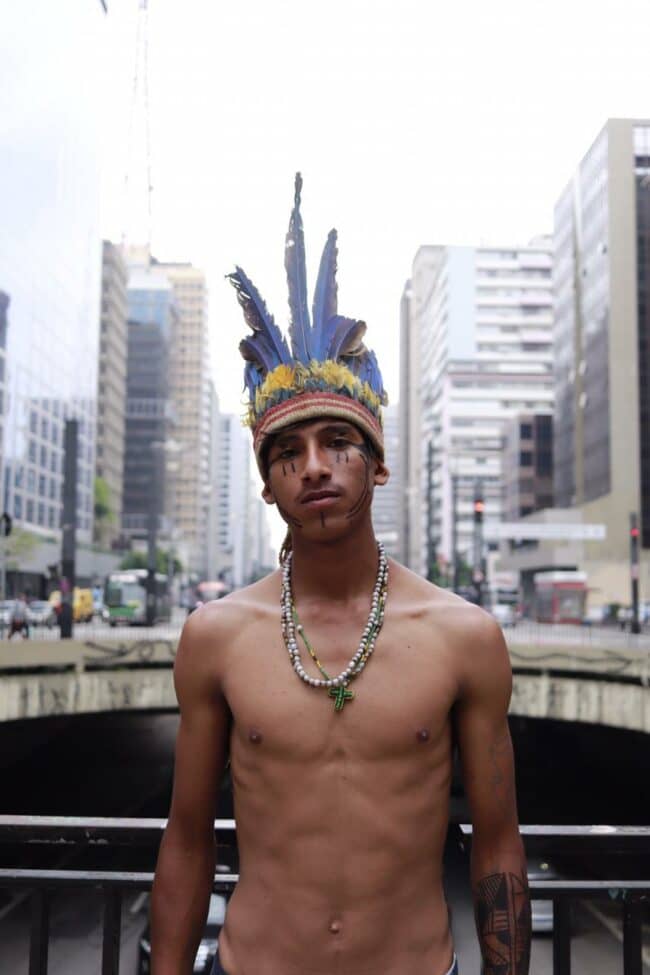TWFF: How did it feel to unfold that banner in front of a stadium full of people when you were so young?
KMC: I was scared because I hid the banner going in and no one knew I had it—not even my father—but I felt I had to fight and talk about my people so the world would see.
TWFF: More recently you represented Brazil for the United Nations Human Rights Day. How did that feel?
KMC: It was very special. Any time I am able to share my culture with other communities and people, I am happy to do so.
TWFF: Tell us a little bit about the Guarani culture.
KMC: We have a very sacred place called Opy where we pray, sing, smoke from ceremonial pipes and learn about our ancestors. In the Indigenous culture, we believe in passing knowledge down from generation to generation. Though stories are most often shared orally, having a writer for a father, we’re able to preserve ours on paper as well.
What makes Opy very special is that it is also a hospital where we administer spiritual and physical cures for ailments. These cures can come from many things, including art, which is sometimes used to help heal.
TWFF: I can certainly relate to art being used in healing. It’s nice to see it acknowledged that way.
KMC: We also protect our forest language by only speaking Guarani in our schools. We speak Portugese when talking to non-Indigenous members outside the community.
TWFF: How has Covid-19 affected your people?
OJ: Though we went into the city much less often once we learned of the pandemic, it still got to us. I recently had the virus, and many members of our family have suffered from it too.
TWFF: I’m so sorry to hear that. Did Kunami have it as well?
OJ: No, I told him he was so skinny Coronavirus couldn’t find him. (laughs)
TWFF: Were you able to get good healthcare in the city to manage your symptoms?
OJ: No, we actually went into our forest and looked for ways to treat it naturally. That helped very much and we have all since recovered.
TWFF: I’m so glad to hear that. In addition to the pandemic, Brazil has endured some very volatile times recently. What are the biggest issues facing Indigenous groups in your country?
KMC: The problems that Indigenous people face are different depending on the region. Our village is near São Paulo so we always have food, but on the other hand there’s a lot of prejudice against Indigenous people.
My father is a writer so he often went into the city to deliver lectures as I grew up and I was fortunate enough to go with him. I only spoke Guarani as a child so whenever I would go to the city, I was called ‘stupid’ because I didn’t speak Portugese. I always defended myself and told them I didn’t need to speak their language because I had my own in our village. But attitudes like that toward Indigenous communities are still a problem.
When I participated in the film, My Blood is Red, I met other Indigenous peoples who are in a constant fight for their land. The government has taken it for use in farming cattle, sugar and other things. Many Natives die because these battles become physical fights for the territory. So it really depends on the area, but we’re all facing something. We are all struggling in one way or another.
TWFF: Since you live a traditional Guarani lifestyle in the village, how did you decide that rap music was the way you wanted to express yourself? Were you exposed to rap music in the city?
KMC: I didn’t know I was a rapper! (laughs) I just created poetry and then put it to music. My brother listens to the indigenous rap group Bro MCs so I was also influenced by them.
TWFF: Where do you perform your music?
KMC: Before the pandemic, I went alongside many of my father’s lectures with my brother and made videos, but after the virus passes I will go on a proper tour. I hope to have a new album released in early 2022.
TWFF: How did you choose your rap name, Kunumi MC?
KMC: I chose it because it means “Young man who is learning something new every day.”
To see Kunami perform online, view his video for Força de Tupã. When he was younger, he also authored a book, Kunumi Guarani, which is available for purchase on Amazon.com.
Photo by Aruan Viola.


